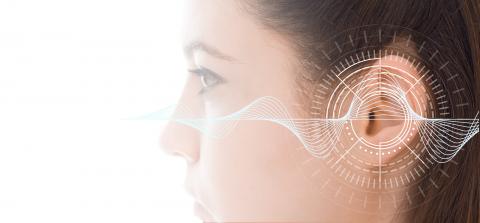
Tinnitus is often described as a ringing, humming, or buzzing sound. Most people have experienced tinnitus at some point—think of the high-pitched noise that lingers after being at a loud concert or a nightclub. While most people report their tinnitus as “non-bothersome”, for those who are severely affected, it can significantly impact quality of life.
By definition, tinnitus (pronounced tih-NITE-us or TIN-ih-tus) is the perception of sound that cannot be attributed to an external source. When tinnitus is subjective, only the person with the tinnitus can hear the noise. When it is objective, as in the case of a whooshing sound with each heartbeat, a physician may be able to hear the same sound with a stethoscope. 37% of adult Canadians report experiencing tinnitus last year; for 7% it affects their day-to-day activities.
Tinnitus is a symptom that wears many hats. It may be:
- Up to 60 different sounds
- A single sound or multiple noises
- Low, medium or high pitched
- Intermittent or constant
- Perceived in one or both ears
Because tinnitus doesn’t sound the same for everyone, it’s hard to identify and develop a treatment. This is why treatment and management approaches must be uniquely tailored to an individual’s specific needs. Currently, there are no widely accepted pharmaceutical or surgical interventions for treating tinnitus.
What causes tinnitus?
There are a variety of factors that may be associated with tinnitus:
- Hearing loss
- Noise exposure
- Head injury
- Thyroid problems
- Muscle tension in head/neck
- Specific medications
- Other health concerns such as Meniere’s disease
By far, hearing loss is the largest contributing factor with 70-85% of people with hearing loss reporting some tinnitus.

Where does tinnitus come from?
Well, we don’t actually “hear” with our ears, we “hear” with our brain. This is an important concept when it comes to understanding the cause of tinnitus. Here’s what
one study of chronic tinnitus uncovers:
> The peripheral auditory system (outer, middle or inner ear) is damaged
> The brain receives fewer sound signals
> The brain compensates by increasing
neuron activity in hearing pathways
> Resulting in a phantom perception of sound
This causes the individual to perceive a sound that is not coming from the external environment. Instead, the phantom sound is generated inside the body by hyperactivity of the neurons in the auditory (hearing) pathways.
Are other systems in the body involved?
Experts suspect that non-hearing related pathways are also impacted by tinnitus.
Autonomic nervous system:
The
autonomic nervous system controls our unconscious reaction to a stimulus (i.e. our fight or flight response). Tinnitus may trigger the autonomic nervous system, which responds with a stress response. This can lead to increased blood pressure, trouble sleeping or difficulty concentrating.
Amygdala:
The
amygdala is responsible for our emotions. Tinnitus triggers the amygdala to associate negative emotions such as depression, frustration, anger or sadness with the tinnitus.
For people who are extremely bothered by tinnitus, it’s likely that the autonomic nervous system and amygdala have been engaged.
Who should treat tinnitus?
People with tinnitus are often told, “You just have to learn to ignore it.” Audiologists do not approach tinnitus this way. Audiologists are trained to investigate potential causes of tinnitus, make referrals to medical professionals and provide counselling and treatment when appropriate.
Our goal is always to investigate the underlying cause and provide management options and treatment for the individual experiencing tinnitus. Treatment starts with a diagnostic audiologic test battery as part of a thorough tinnitus assessment.
Tinnitus remedies
Tinnitus treatment often focuses on treatment of hearing loss,
mindfulness based stress management, relaxation, reframing emotional responses and habituation. Management approaches are uniquely tailored to the individual experiencing the tinnitus.
Permanent hearing loss
Treatment with hearing aids improves tinnitus in about 50% of cases and can remove tinnitus in about 20% of cases. Hearing aids today often have the option of a built-in tinnitus masker that will play white noise, ocean waves or fractal (zen) tones to help with tinnitus habituation and sound enrichment.
Habituation
This is the process of becoming accustomed to a stimulus without conscious effort. In other words, treatment focuses on the person’s reaction to the tinnitus. Some of the common management approaches are tinnitus retraining therapy (TRT), mindfulness-based tinnitus stress reduction, and cognitive behavioural therapy (CBT).
If the individual has trouble sleeping, concentrating at work, or if they are dealing with depression and anxiety related to their tinnitus, treatment approaches will be focused on managing these specific concerns.
Speak to our Audiologists about managing tinnitus
Tinnitus affects everyone differently. Some people are not as bothered by their tinnitus and put up with the sound day-to-day. Others may find their tinnitus extremely distressing, negatively impacting their quality of life.
If you need relief from tinnitus, speak with us about
Tinnitus Retraining Therapy. This therapy is the gold standard in treating tinnitus that does not involve any surgery or medication, and has no side effects. We successfully use sound therapy and counselling strategies to help people gain control over their tinnitus. Call us to schedule a tinnitus appointment:
Broadmead Hearing Clinic: 250-470-2926 or
Oak Bay Hearing Clinic: 250-479-2921.


